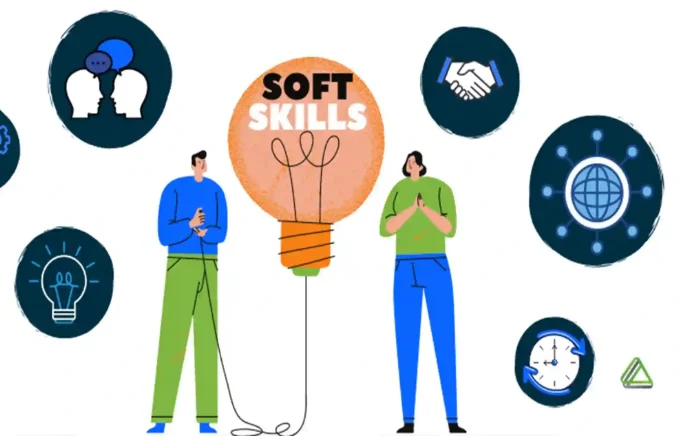

Image Source: ismartrecruit
Update: This article was last updated on 12th January 2026 to reflect the accuracy and up-to-date information on the page.
Excellent academic results are not the only prerequisites that help your children make it big in life. If you wish your kids to survive the cut-throat competition out there, you must inculcate soft skills for kids among your kids.
As concluded by Stanford and Harvard University’s research findings, nearly 85% of students’ job accomplishments depend on the finest soft skills for students.
Before you get confused, let us introduce you to the very basic definition of soft skills for school children. Basically, these are the personal attributes that help your kids convey their thoughts and ideas most effectively and clearly.
If you introduce them to your children when they are young, then in the crowd they will stand tall.
If clueless about ways to develop these soft skills among students, fret not. Our blog lists for you the best 10 school kid soft skills that you mustn’t miss learning about. Read on further to know all about it!
In what ways may soft skills be applied inside the classroom? Let us consider improvement of teamwork and communication through group projects, which is a necessity for soft skills training among students.
Teaching soft skills to fourth and fifth graders affirms that they are to be given a stable platform and practices in life to develop good interpersonal relationship and self-management skills.
By focusing on these essential skills, you can equip your child with the tools needed for personal and academic success, making them future-ready.
10 Soft Skills That Can Change Your Kid’s Life for the Better!
“Communication-the human connection is the key to personal and career success”
Paul J. Meyer

1. Communication
If your kids know how to communicate their ideas and feelings clearly, then no power can hold them back from achieving greater things in life. Soft skills for kids are the actuality of building confidence and therefore effective communication. Teaching active listening to students, teamwork, and respectful self-expression are some of the soft skills for students that can guarantee their success in the classroom and beyond.
Encourage your children to communicate confidently in different settings, as soft skills for school children play a very vital role in their overall development. Focusing on how soft skills could be developed in students through practical activities such as storytelling, debates, and role-playing can help the students build key competencies.
Cultivating soft skills for fourth and fifth graders through fun, age-appropriate methods equips them with the tools they need to collaborate, resolve conflicts, and present ideas effectively. Prioritizing soft skills training for students ensures they grow into confident, empathetic individuals ready to face future challenges.
2. Leadership
Leadership skills go a long way in fetching phenomenal results from the career perspective of your child. A good leader brings their team together and keeps it motivated. The person can make crucial decisions in the worst circumstances and take their team toward achievement. Soft skills for kids like leadership are absolutely essential for growing up and to become a completely well-rounded child. Soft skills for students are very easily acquired at home.

Children learn from their parents and elder siblings on how to perform various things such as imitating them to pick up essential soft skills in children going to school and leadership on how you dole out responsibilities, handle your daily work, etc. Leadership forms one of the significant dimensions of soft skill training for students and ensures teamwork and development of decision-making skills.

3. Critical Thinking
Let them ask “why” as many times as they want. Your children must be able to think critically. A person who thinks critically can express his/her opinion without feeling threatened. It is very important that your children have an opinion of their own. Critical thinking skills,
which are an essential part of soft skills for kids, will save them from the mentality of following the crowd. Soft skills for students like critical thinking and self-expression can be encouraged to a great extent.
Moreover, developing soft skills for the school children will make them confident to present their opinions in the classroom. In what ways do soft skills can a student use in the classroom? They can be able to have discussions, work together to solve problems, and express themselves. By nurturing these abilities, you are providing a foundation for essential soft skills training for students, which is particularly important for soft skills for fourth and fifth graders and beyond.
4. Teamwork
The ability to work in teams without losing patience is one of the greatest boons of life. If your child is a solo person, then teach them the value of teamwork. Make them realize how being a team player will fetch them great results in life.

Teamwork is an important part of developing soft skills for kids and soft skills for students, as it encourages collaboration and effective communication. Soft skills for school children and soft skills for children can be taught while they are playing as well as during household chores. Let them delegate the tasks among their friends/siblings and ask them to perform as a team.
In what ways can soft skills be used by a student in the classroom? Group projects and shared responsibilities are excellent opportunities. Soft skills for fourth and fifth graders, as well as soft skills for school kids, can also be developed through games and tasks requiring cooperation. Soft skills training for students will ensure long-term benefits in teamwork and social interaction.

5. Time Management
Life is becoming more hectic day by day. Even your children are getting more and more occupied with their studies, coaching classes, and extracurricular activities. Teach your kids about the importance of punctuality as part of developing essential soft skills for kids. Soft skills for school children, such as time management and responsibility, are crucial for their personal growth. Tell them about the disadvantages of procrastination and how it can affect their productivity.
Soft skills training for students can help instill discipline and better time management skills. Also, give them examples of eminent personalities who have managed to achieve heights by utilizing every minute efficiently. In what ways do soft skills can a student use in the classroom? They can improve teamwork, communication, and effective task completion, which is very essential for fourth and fifth graders.
6. Creativity
A creative mind can win hearts. Don’t believe us? Learn it from the OG – Steve Jobs. This legend made it loud and clear that being creative in the workplace can be a huge asset for anyone. Soft skills for kids are creativity and communication. The more creative the child is, the better will be his development. Kids are born creative. Don’t try to overburden the creativity of your child with realism. Encourage them to use and gradually their creative mind.

Soft skills for students, especially in the early years, are vital for their growth personally and academically. Introducing soft skills training for students and teaching soft skills for school children, such as cooperation and flexibility, will help them to achieve their success in life. In which ways can a student use soft skills in the classroom? The most effective one is creativity, making it essential for soft skills for fourth and fifth graders to embrace imagination and innovative ideas.

7. Adaptability
Teach your children that change is the norm. Bring them up as strong people who do not crumble down at the mere sight of slight changes. Adaptability and resilience are two important soft skills for kids, for their growth. Let them be very adaptable.
Teach them that the world does not stop no matter what. A person adaptable enough can survive even the most brutal of times and come out on top.
Soft skills for students, like problem-solving and emotional intelligence, help the children tackle the difficulties of life. With the soft skills training of students, parents and educators can make sure that the child will develop confidence and flexibility in the way towards success.
8. Work Ethics
Your children must know the difference between right and wrong. Right from the start, make them develop strong work ethics. Make them understand about their responsibilities. Let them know that they are also accountable.

A student who will put in great effort at school level is branded as a responsible person, and this has a bearing on their character promotion; soft skills for children are of top importance so as to set them in all-round development. Teaching soft skills for students will make the child acquire the tools to take responsibility or navigate the social setting, hence greater performance.
Soft skills for school children will help them to develop better relationships with their peers and teachers. In what ways can a student use soft skills in the classroom? It can enhance their participation and communication. It is also very important to begin to focus on soft skills for fourth and fifth graders in preparation for the future academic and personal challenges that they may face. With soft skills training for students, we can help them become well-rounded individuals who are not only academically strong but also emotionally and socially competent.

9. Self-confidence
Teach them self-reliance. Make them confident so that they grow as self-confident individuals. When your children are confident enough, they will never give up, even in the toughest of situations. Nothing can break them if they are confident enough. Building soft skills for kids plays a crucial role in this process, helping them develop resilience and emotional intelligence.
Encouraging the development of soft skills for students teaches them how to communicate, collaborate, and solve problems effectively. This is especially important for soft skills for school children, as they are foundational for success in both academics and life.
Soft skills training for students can help them navigate challenges in the classroom and beyond. For soft skills for fourth and fifth graders, focus on teamwork, conflict resolution, and critical thinking to enhance their overall development. In what ways do soft skills can a student use in the classroom? These skills help students express themselves clearly, work well with others, and manage their emotions, creating a positive and productive learning environment.
10. Problem-solving
Let your kids know about age-appropriate problems. Engage them in active discussions. Assure them that they are a part of the discussion. Seek solutions and ideas from them. The difference between successful personalities and not-so-successful ones lies in their problem-solving abilities.

Developing soft skills for kids may help in building these abilities. Soft skills such as communication, teamwork, and adaptability at school play an important role in the success of students. How to develop soft skills for students from a very early age is beneficial to students both academically and socially. These are skills that are important for student soft skills to be acquired by school children because they help in communicating effectively and also working together.
Soft skills for kids fourth and fifth graders are of significant importance since they take on more demanding tasks and projects. Development of student soft skills will make the children understand how to work with others and face problems in the classroom. Soft skills training for students ensures they are well-equipped to navigate their educational journey and beyond. In what ways can soft skills be used by a student in the classroom? They can use these skills to communicate clearly, work well in teams, and solve problems effectively.
Parting Thoughts
Soft skills, if imbibed from the initial stage, get assimilated into the personality of your child intrinsically. It requires a lot of efforts and patience to teach the soft skills to your children. However, with frequent efforts, you will see how your kid’s behavior changes. And then, you will realize that all the hard work is worth doing!
Enroll your child in Moonpreneur’s Power Skills Program today and make your child future-ready by enhancing his soft skills and confidence.
Moonpreneur’s Innovator Program is creating the workforce of tomorrow by equipping the students with the knowledge of AI/ML, Robotics, Coding, IoT, and Apps, through experiential learning and empowering the younger generation to be future entrepreneurs.

























How can parents incorporate the teaching of empathy and emotional intelligence into their children’s daily routines?
Parents can integrate empathy and emotional intelligence into their children’s routines by actively listening and validating their feelings. Encouraging open conversations creates a safe space for expression. Reading books or watching shows that highlight diverse perspectives fosters understanding. Setting positive examples of empathy in action and encouraging acts of kindness reinforces these skills.
What creative methods can be employed to instill adaptability and problem-solving abilities in kids?
Engage kids in imaginative play that presents challenges and encourages them to devise solutions. Puzzles, brainteasers, and strategy games develop critical thinking. Encourage them to explore diverse activities to adapt to new environments. Foster a growth mindset by praising effort and resilience. Encourage them to tackle age-appropriate responsibilities independently, fostering self-reliance and adaptability. Emphasize learning from failures, nurturing a proactive problem-solving approach in navigating life’s challenges.